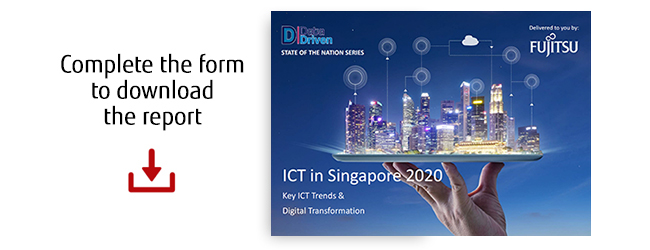
Digital Transformation is well advanced in Singapore
Fujitsu commissioned DataDriven, an Asia/Pacific based research and advisory firm to conduct a major study of 125 ICT decision makers in Singapore. The ‘State of The Nation: Singapore Key ICT Trends and Digital Transformation, 2020’ survey identified that Singaporean technology leaders take their responsibilities for aligning their operations with overall corporate responsibilities very seriously.
Most organizations are well advanced on their Digital Transformation (DX) journey. Around half said that DX programs are ‘mature and outcomes delivered’ or ‘well underway’ in the areas of operations (55.2%), customer service (50.4%), marketing (48.8%) and within their ICT department (48.0%).
Biggest challenge lies in adopting new technologies
But they still need to conduct business as usual, with all the challenges that entails. The most significant of these challenges, mentioned by 83.2% of respondents, is aligning existing ICT systems with new digital technologies, the procurement of these technologies, and the time it takes to achieve benefits from them.
Cloud computing has reached a tipping point. Nearly half of all respondents reported that cloud programs are mature or well underway in the areas of ICT (47.20%), marketing (41.6%) and sales (40.0%). The most important criteria in the selection of cloud suppliers are the security of the service (72.0%), high reliability (67.2%) and ease of access over the network (64.0%).
Security remains the key issue. When asked about specific challenges they faced in their ICT operations, email security was at the top of the list (70.0% of respondents), closely followed by data center security (69.1%), network security (68.3%) and securing the cloud (65.6%).
Lower costs and higher productivity are the key drivers
There is great deal of consensus on the key priorities facing the ICT function. Around two thirds of all respondents rated reducing costs (70.0%) and increasing productivity (69.9%) as significant objectives.
There are many external factors impacting ICT strategies and budgets. Nearly two thirds (64.8%) of respondents say that technology changes have the most significant positive impact on their budgets. R&D Investment (55.2%) and employment rates (51.2%) are the next two most positive impacts.
AI considered an opportunity rather than a threat
A key area of technology driving investment is the Internet of Things (mentioned by 41.6% of respondents). Artificial Intelligence (AI) is starting to make an impact, with 34.7% of respondents having initiated programs. Three quarters (76.0%) believe AI is an opportunity and only 4.8% that it is a threat. Two thirds (69.6%) agree that AI will enhance the capabilities of people and that AI will enable a better quality of life (67.2%).
How do these challenges and technologies translate into reality? How do they affect actual expenditure? Respondents were asked what changes will take place in their organization in the next 12 months, in terms of changes to the ICT budget, expenditure in various areas, and ICT headcount.
IT budgets in Singapore are growing
Singaporean ICT decision makers are generally positive about their budget expectations in the next 12 months, with almost half (45.0%) expecting overall budget increases across all categories. The largest increases are expected in cloud services (54.4% of respondents) and cloud processing (49.6%). Around half are expecting increases in budgets for outsourcing (50.4%) and digital transformation (48.8%). Nearly half (47.2) are expecting increases in operational expenditure (OpEx) and capital expenditure (CapEx – 44.0%). Slightly fewer (41.6%) expect budget increases in full-time or permanent staff, or contract and part time staff (39.2%).
The survey shows that ICT decision makers in Singapore have a solid understanding of the challenges facing their organization, and the objectives, strategies, tactics and technologies required to drive organizational objectives. They are interested in exploring new technologies, but they do not implement them for their own sake. They are generally cautious, because they know that the role of ICT is to support the business, and that must take priority over everything else.
To read the full research report, click the download button above.

